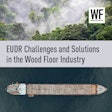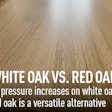Earlier this year, when I was at the NWFA Expo, I did my usual thing-an informal survey of industry and non-industry both about green issues. (I like to ask folks as I travel what they know about these issues we spend so much time on-I ask my seat mates on planes, waiters in restaurants, taxi drivers and bellhops … anyone inclined to chat for a moment or who asks me what I do. And of course when I'm at a wood convention, I'm always seeking more information on market awareness and market demand for green attributes.)
As usual, I found that almost no one outside the wood industry knew what FSC meant. (In fact, on my Dallas trip, I think I batted zero in FSC name recognition outside the industry.) This is never a surprise, but always a bit of a disappointment considering how much pressure is often put on the industry to go FSC. And definitely it is an indication that there is no widespread added economic value to selling an FSC product-no one in the general public I spoke to was prepared to pay a premium for it after I explained what it was.
Anyway, within the industry of course, FSC was well-known (if not universally loved.) I found generally weak upcoming EPA regulations on formaldehyde.
As for Lacey, the law was mostly misunderstood by people I spoke with. Most folks saw it as only applying to imported wood, not domestic production. I was particularly fascinated by this statement by an industry professional: "Isn't it that that made-in-America thing?" He then went on saying that it didn't really matter to him because he "never handled bamboo."
We talked a bit and it was clear that he had only a vague awareness of Lacey. (He's a retailer/installer handling dozens of lines including both imports and domestic production.) He thought it was a promotion by the domestic industry for "Buy American." He was unaware that he had responsibilities as a retailer under Lacey and he was unaware that it applied equally to domestic and international production. He was stunned to discover that even if he was innocent of any wrong-doing, his stock was liable for confiscation if it was found in to be in violation. He agreed that supporting an amendment to allow innocent owners some form of redress was the right thing to do.
Lacey was designed to reduce and ideally eliminate illegally harvested material from the American supply chain. It's gone a long way toward doing that. However last year it also somehow moved beyond being an environmental policy to being an American job bill. My industry friend was right-it became that "Made in America" thing. We have to move away from that.
We need to look at making Lacey a positive force in our industry, one that promotes and encourages the legal harvest of wood all around the world. We need to make it practical for companies to follow and one that recognizes sincere compliance efforts. An amendment to Lacey is likely to be on this fall's congressional legislative agenda, and I would encourage the industry to get behind it, to strengthen Lacey through a practical and respectful amendment. Make it clear that it is a "Buy Legal Wood" thing.
































